Politics
About Andrew Cusack
 Writer, web designer, etc.; born in New York; educated in Argentina, Scotland, and South Africa; now based in London.
Writer, web designer, etc.; born in New York; educated in Argentina, Scotland, and South Africa; now based in London. read more
News
Blogs
Reviews & Periodicals
Arts & Design
World
France
Mitteleuropa
Knickerbockers
Argentina
The Levant
Africa
Cape of Good Hope
Netherlands
Scandinavia
Québec
India
Muscovy
Germany
Academica
‘Dim Tim’ & Chick-lit Bagshawe go twit for tat over “slobbering” devotees of Thérèse
Tim Cheetham, a Labourite councillor in the legendary south Yorkshire town of Barnsley, has expressed his disdain for the enthusiasm his fellow countrymen and women have shown for the beloved Saint Thérèse of Liseux via the medium of Twitter: “With all those slobbering zealots kissing that glass case, I hope it has some mystical power to prevent swine flu.” As Catholic Herald editor Damian Thompson states, “That’s the authentic voice of 21st-century Labour.”
Louise Bagshaw, a “chick-lit” novelist, prospective Tory party candidate, and Woldingham old girl, wasted no time in responding. “Nice to describe faithful Catholics venerating a relic as slobbering zealots. Would you use such bigoted language about Muslims?”
Cheetham’s rather lame retort: “As the church has issued new guidlines [sic] about the conduct of ceremonies to protect against spreading disease, it needed saying.”
Bagshawe: “Labour’s anti-Catholicism is breathtaking sometimes.”
Damian Thompson continues:
Another tweet from Cheetham: “It’s not Bigotry to highlight the lunacy of dark age mysticism in the modern world.” Really? OK, then let me put you on the spot, councillor.
You say: “I will decry any faith that denies my right to question it in whatever form I wish.” Well, Muslims in Barnsley do object to the slightest criticism of their Prophet (who lived during the dark ages, as it happens) with his child wives and message of violence. But you’re a brave man, it seems. So go on: speak fearlessly and with your trademark withering disdain about the zealots in your own town.
Dim Tim later tried to backtrack by blaming the medium of Twitter for his own idiotic remarks.
To my knowledge, Barnsley’s not a town short on Catholics. Let’s hope those “slobbering zealots” make it to the polling place the next time the council’s up for election.
Prague Prince Propels Pristine Party
New Grouping May Hold Balance of Power After Next Bohemian Vote
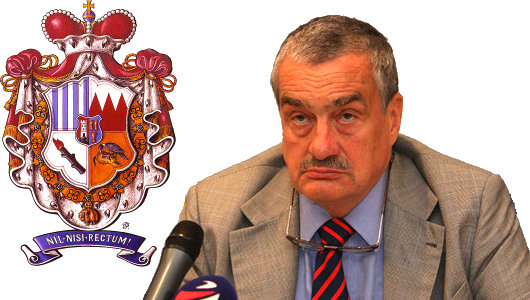
PRINCE KARL VII, current head of the House of Schwarzenberg and sometime foreign minister of the Czech Republic, recently combined with other political colleagues to form a new party in time for the upcoming parliamentary elections in Bohemia. A number of supporters of the Christian & Democratic Union – Czechoslovak People’s Party (KDU-ČSL) were disappointed with the selection of the left-leaning Cyril Svoboda as party chairman, and have formed a new conservative group, Tradice Odpovědnost Prosperita 09 or “Tradition Responsibility Prosperity ’09″.
Prince Karl — or Karel Schwarzenberg as he is known for electoral purposes — suggests that Bohemian voters have grown disenchanted with the current choice of political parties on offer. “The results of the last elections – the worst were the election to the European Parliament, but even the national elections – show that the degree of support for political parties by Czech citizens is going steadily down,” the Prince told Radio Prague.
“People are evidently not content with the parties that are offered to them, and they are more and more fed up. I read this in the e-mails I get and letters, and hear it in pubs and wherever. And as we think that there is still a lot of work to be done in our country, we decided to offer at least some alternative. That’s it.” (more…)
The March Against Socialism
America: Has the Old Girl Got Some Life in Her Yet? Difficult to Say.
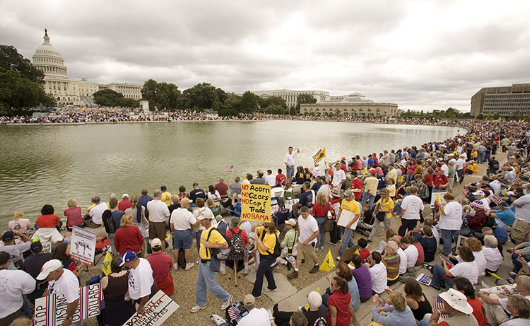
AMERICA CONTINUES TO surprise me. After eight horrible years of a Trotskyite policy abroad under Mr. Bush & co., Americans are now up in arms over Mr. Obama’s proposals to have a socialist domestic policy in addition to our revolutionary foreign policy. And rightly so! But one can’t help but wonder: why weren’t these folks protesting four years ago? Better late than never, I suppose. I still won’t be placing any bets on America — though if the bet is made in U.S. dollars, it won’t matter whether you win or lose as it’d be worthless all the same — but protests like these make me wonder if this country might have a future after all. (more…)
Hey Washington
How’s that piss-off-the-Russians-no-matter-what-the-cost policy turning out for you? Oh? Not so good?
Whiskey Tango Foxtrot
Followers of recent news in right-wing French politics will be able to decipher this text message:
I hope to share more thoughts on this controversial subject when I get back to New York in September, but I’m busy settling my affairs in Africa this week, then hunkering through Edinburgh & London the following weeks, before I return to the glories of uncapped internet access. Until then, it can be followed in French at Le Salon Beige, among other blogs.
Metternich: Ex Ordine Libertas
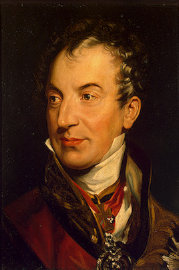
Fürst von Metternich-Winneberg-Beilstein
Seanad Éireann
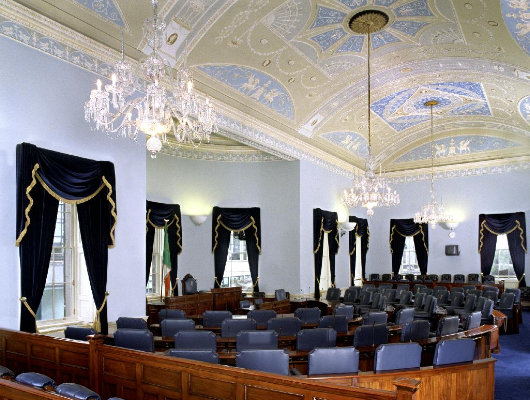
Ireland’s senate is a curious creature. Its first members were co-opted & appointed and these included seven peers, a dowager countess, and five baronets and knights, twenty-three Protestants, and a Jew. Among this cast of characters were W. B. Yeats, General Sir Bryan Mahon, and the physician-poet-author Oliver St. John Gogarty. In 1937, however, the Seanad Éireann took its current form, and since the abolition of the Bavarian upper house in 1999, the Seanad is (so far as my research can discover) the last corporately organised parliamentary body in Europe.
There are sixty members of the Irish senate, who are chosen by a variety of means. (more…)
The Prime Minister of China who became a Benedictine Abbot
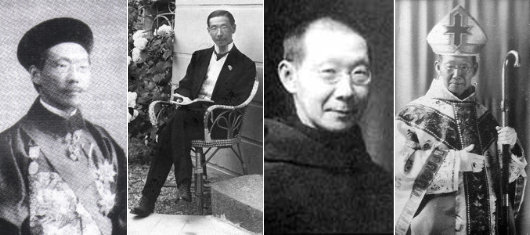
CHRISTIANITY HAS A LONG and varied history in China stretching over at least one-and-a-half millenia. The ancient country has even had Christian leaders, such as the Congregationalist founder of the Chinese Republic, Sun Yat-sen, and his Methodist successor, Gen. Chiang Kai-shek (head of the Kuomintang for nearly forty years). Still, until I read this fascinating story in the Catholic Herald I had no idea that there was a Prime Minister of China, Lou Tseng-tsiang (陸徵祥), who ended his days as a Benedictine monk by the name of Dom Pierre-Célestin. Lou was born a Protestant in Shanghai in 1871, but married a Belgian woman and eventually converted to Catholicism. Serving his country in the diplomatic arena, he accomplished extensive reforms of the Ministry of Foreign Affairs, avoided becoming part of any of the various factions that divided the government, and was one of the founding members of the Chinese Society of International Law. Lou bravely stood up to the indignities imposed upon China through the 1919 Treaty of Versailles by refusing to sign the shameful document which sewed the seeds of future disaster.
Xu Jingcheng, Lou’s mentor and sometime Ambassador to the Court of the Tsars in St. Petersburg, instructed the up-and-coming diplomat that “Europe’s strength is found not in her armaments, nor in her knowledge — it is found in her religion. … Observe the Christian faith. When you have grasped its heart and its strength, take them and give them to China.”
After the death of his wife, Lou became a Benedictine monk at the abbey of Sint-Andries in Flanders, and was eventually ordained a priest in 1935. A decade later, Pope Pius XII — who cared deeply for the Church in China and finally settled the long-standing dispute over Chinese ancestor-honouring rituals in favour of the practices — appointed him titular abbot of the Abbey of St. Peter in Ghent. Sadly, the Chinese Civil War prevented Dom Pierre-Célestin from returning to China, and he died in Flanders in 1949.
The words of Lou’s mentor that Europe’s strength is her faith found recent confirmation from Professor Zhao Xiao, a prominent Chinese economist at the University of Science & Technology Beijing. Prof. Zhao, a member of the Chinese Communist Party, began studying the differences between the economies of Christian societies and those of non-Christian societies. As a result of his investigations, he argued that Christianity would provide a “common moral foundation” for China that would help the economy by reducing corruption, narrowing the gap between rich and poor, preventing pollution, and promoting philanthropy.
“A good business ethic or business morality,” Prof. Zhao says, “can provide for a type of motivation that transcends profit seeking. Why do people want to do business? The main goal would be to earn money. The purpose of a company is to maximize profits. But this can cause companies to look for quick results and nearsighted benefits. It can cause companies to disregard the means and earn money at the expense of destroying the environment, society and the livelihood of others, or endangering the entire competitive environment of the trade.”
“If my motivation for doing business is the glory of God, there is a motivation that transcends profits. I cannot go and use evil methods. If I used some evil methods to enlarge the company, to earn money, then this is not bringing glory to God. Therefore, this is to say that it [bringing glory to God] can provide a transcendent motivation for business. And this kind of transcendental motivation not only benefits an entrepreneur by making his business conduct proper but it can also benefit the entrepreneur’s continued innovation.” (more…)
Of tribes and traditions
In tribal Africa, Ghaddafi expounds traditional government; Meanwhile ethnic Romanians vote to be ruled by their German neighbours.
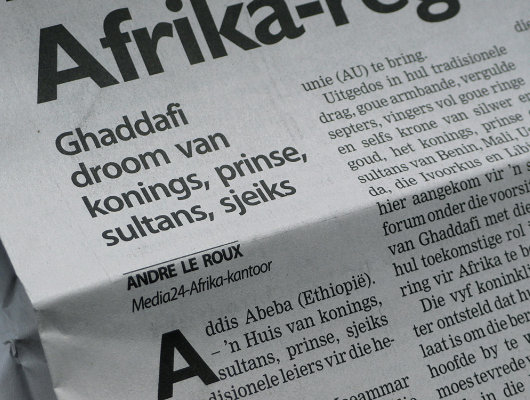
«Ghaddafi dreams of kings, princes, sultans, sheiks»
reports the Afrikaans newspaper Die Burger.
ONE OF THE LESS-REPORTED aspects of the selection of Col. Moammar al-Ghaddafi, the tent-dwelling Libyan leader and notorious eccentric, as Chairman of the African Union was his proposal that an upper house of “kings, princes, sultans, sheiks, and other traditional leaders” be added to the Pan-African Parliament. Col. Ghaddafi has been forthright in his condemnation of democracy as ill-suited to the African continent. “We don’t have any political structures [in Africa], our structures are social,” he explained to the press. Africa is essentially tribal, the argument goes, and as such multi-party democracy always develops along tribal lines, which eventually leads to tribal conflict and warfare. “That is what has led to bloodshed,” the AU chairman posited, citing the recent example of the Kenyan elections.
Europe, of course, solved the matter of tribal difficulties by brutally uprooting long-established peoples from their native lands after the Second World War and transferring them to jurisdictions in which they would ostensibly be part, not only of the majority, but of theoretically “national” states. Cities with centuries of Polish history became Soviet, towns as German as sauerkraut became Polish, and so on and so forth. Sometimes the undesired populations of multi-ethnic places were cruelly murdered, as recent revelations from the police in Bohemia have shown.
Still, remnants of the old cosmopolitan order remain. (more…)
The eternal specter of the National Party
Above: Irish journalist Fergal Keane interviews a poor black South African.
This recent general election in South Africa marked the first time since 1910 — the year the country was unified as an independent dominion — that voters weren’t given the option of voting for the Nationalists. The party was founded in time for the 1914 election, and first entered government in coalition with the Labour party in 1924, but their most famous victory was in the general election of 1948. It was then that they won an outright majority and introduced the ideology of apartheid. The famous Brazilian counter-revolutionary Dr. Plinio Corrêa de Oliveira was of the opinion that South Africa had been in the process of developing a genuinely feudal society until the introduction of apartheid put a full-stop to this evolution.
Evil and heretical though apartheid was, such are the wounded and fearful hearts of men that it won for the National Party each successive general election until the introduction of universal suffrage in 1994. Admittedly, a large proportion of the Nationalist vote was not necessarily a vote for apartheid but instead a vote against communism. Soviet-backed communist subversion escalated sharply throughout Africa in the 1950s, especially as Nelson Mandela launched his internal coup taking over the previously broad-based & non-violent African National Congress and transforming that body into an officially and openly Soviet-aligned group with a terrorist wing whose activities rightly landed him in jail.
With the end of apartheid, the Nationalists had to contend with a universal adult electorate of every South African over eighteen years of age. In 1989, the last election under apartheid, over 2,000,000 whites, 261,000 coloureds (mixed-race people), and 154,000 Indians took advantage of their right to vote. In 1994, meanwhile, over 19.5 million voted. Most interestingly, the votes of the (mostly Afrikaans-speaking) coloured population — whose right to vote was taken away by the Nationalists in the 1950s before being quasi-reintroduced in 1984 — turned around and voted for the National Party en masse, out of fear for the behemoth of the black-dominated ANC.
The party still came second in the 1994 election with 20% of the vote — a respectable result considering the massive media push supporting Mandela & the ANC. But the National Party refused to take advantage of their showing. Under their supremely naïve leader, F. W. de Klerk, instead of forming a noticeable opposition to the ANC behemoth and thus laying the foundations for a robust tradition of antagonistic government and opposition debating eachother, the Nationalists did the worse thing imagineable and actually joined the government (as did the leaders of the black-conservative Inkatha Freedom Party). Had the Nationalists & Inkatha joined forces then as a united multi-racial moderate conservative opposition to the ANC, South Africa’s democracy would be in a much healthier state than it is today. Instead, they chose the gravy train and the voters have punished them in every subsequent election.
For their sins of opportunism, the Nationalists were rightly abandoned by voters and eventually the party dissolved itself and more-or-lessed merged into the ANC they had spent decades proclaiming the dangers of. Marthinus van Schalkwyk, the last leader of the Nationalists, is today an ANC member and cabinet minister. (Here I must concede that he is actually quite a capable minister and was a very sound conservationist as Minister for the Environment; his current portfolio is Tourism).
So April 2009 was the first general election since the dissolution of the National Party. F. W. de Klerk cast his vote in front of the news cameras and refused to divulge which of the parties got his vote, except that it was for an opposition party. Nonetheless, there were a number of eccentric parties which positioned themselves as new-born versions of the Nationalists. One, founded by a known charlatan and fraudster, actually claimed the name “National Party” and was quite multi-racial in its composition with a broadly populist agenda. Another, the “National Alliance“, was a primarily coloured group based in the Northern Cape. Both, however, used variants of the sun logo employed by the old Nationalists. How did they do? Well, rather predictably, convincing voters to back a party whose two best-known polices are first, apartheid, and second, sucking up to the ANC, was not an easy task. Both parties of a neo-Nat persuasion failed miserably, and I think it’s safe to say we’ll hear little of them again.
Still, the National Party’s forty-six straight years in power obviously impacted the history of this country, and their legacy lurks like a specter in the back of the minds of many. Eccentrics who try to resurrect this dead corpse, however, will swiftly be relegated to the cabinet of curiosities.
Praying with the Kaisers
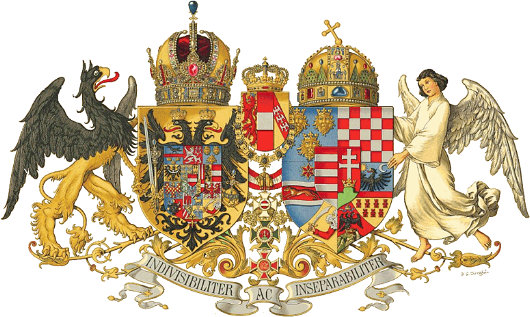
by JOHN ZMIRAK
INSIDECATHOLIC.COM
As I’m writing this column at the tail end of my first trip to Vienna, some of you who’ve read me before might expect a bittersweet love note to the Habsburgs — a tear-stained column that splutters about Blessed Karl and “good Kaiser Franz Josef,” calls this a “pilgrimage” like my 2008 trip to the Vatican, and celebrates the dynasty that for centuries, with almost perfect consistency, upheld the material interests and political teachings of the Church, until by 1914 it was the only important government in the world on which the embattled Pope Pius X could rely for solid support. Then I’d rant for a while about how the Empire was purposely targeted by the messianic maniac Woodrow Wilson, whose Social Gospel was the prototype for the poison that drips today from the White House onto the dome of Notre Dame.
And you would be right. That’s exactly what I plan to say — so dyed-in-the-wool Americanists who regard the whole of the Catholic political past as a dark prelude to the blazing sun that was John Courtenay Murray (or John F. Kennedy) might as well close their eyes for the next 1,500 words — as they have to the past 1,500 years.
But as I bang that kettle drum again, I want to set two scenes, one from a fine and underrated movie, the other from my visit. The powerful historical drama “Sunshine” (1999) stars Ralph Fiennes as three successive members of a prosperous Jewish family in Habsburg Budapest. The film was so ambitious as to try portraying the broad sweep of historical change — and, as a result, it was not especially popular. What historical dramas we moderns tend to like are confined to the tale of a single hero, and how he wreaks vengeance on the villains with English accents who outraged the woman he loved. “Sunshine”, on the other hand, tells the vivid story of the degeneration of European civilization in the course of a mere 40 years. The Sonnenschein family are the witnesses, and the victims, as the creaky multinational monarchy ruled by the tolerant, devoutly Catholic Habsburgs gives way through reckless war to a series of political fanaticisms — all of them driven by some version of Collectivism, which the great Austrian Catholic political philosopher Erik von Kuenhelt-Leddihn calls “the ideology of the Herd.”
From a dynasty that claimed its legitimacy as the representative of divine authority at the apex of a great, interconnected pyramid of Being in which the lowliest Croatian fisherman (like my grandpa) had liberties guaranteed by the same Christian God who legitimated the Kaiser’s throne, Central Europe fell prey to one strain after another of groupthink under arms: From the Red Terror imposed by Hungarian Bolsheviks who loved only members of a given social class, to radical Hungarian nationalists who loved only conformist members of their tribe, to Nazi collaborationists who wouldn’t settle for assimilating Jews but wished to kill them, finally to Stalinist stooges who ended up reviving tribal anti-Semitism. The exhaustion at the film’s end is palpable: In the same amount of time that separates us today from President Lyndon Johnson, the peoples of Central Europe went from the kindly Kaiser Franz Josef through Adolf Hitler to Josef Stalin. Call it Progress.
Apart from a heavily bureaucratic empire that spun its wheels preventing its dozens of ethnic minorities from cleansing each other’s villages, what was lost with the fall of the Austro-Hungarian monarchy? For one thing, we lost the last political link Western Christendom had with the heritage of the Holy Roman Empire. (Its crown stands today in the Imperial Treasury at the Hofburg, and for me it’s a civic relic.) Charlemagne’s co-creation with the pope of his day, that Empire had symbolized a number of principles we could do well remembering today: Principally, the Empire (and the other Christian monarchies that once acknowledged its authority) represented the lay counterpart to the papacy, a tangible sign that the State’s authority came not from mere popular opinion, or the whims of tyrants, but an unchangeable order of Being, rooted in divine revelation and natural law.
The job of protecting the liberty of the Church and enforcing (yes, enforcing) that Law fell not to the clergy but to laymen. The clergy were not a political party or a pressure group — but a separate Estate that often as not served as a counterbalance to the authority of the monarchy. No monarch was absolute under this system, but held his rights in tension with the traditional privileges of nobles, clergy, the citizens of free towns, and serfs who were guaranteed the security of their land. Until the Reformation destroyed the Church’s power to resist the whims of kings — who suddenly had the option of pulling their nation out of communion with the pope — no king would have had the power or authority to rule with anything like the monarchical power of a U.S. president. Of course, no medieval monarch wielded 25-40 percent of his subjects’ wealth, or had the power to draft their children for foreign wars. It took the rise of democratic legal theory, as Hans Herman Hoppe has pointed out, to convince people that the State was really just an extension of themselves: a nice way to coax folks into allowing the State ever increasing dominance over their lives.
A Christian monarchy, whatever its flaws, was at least constrained in its abuses of power by certain fundamental principles of natural and canon law; when these were violated, as often they were, the abuse was clear to all, and the monarchy often suffered. In extreme cases, kings could be deposed. Today, by contrast, priests in Germany receive their salaries from the State, collected in taxes from citizens who check the “Catholic” box. So much for the independence of the clergy.
The House of Austria ruled the last regime in Europe that bound itself by such traditional strictures, which took for granted that its family and social policies must pass muster in the Vatican. By contrast, in the racially segregated America of 1914, eugenicists led by Margaret Sanger were already gearing up to impose mandatory sterilization in a dozen U.S. states (as they would succeed in doing by 1930), while Prohibitionist clergymen and Klansmen (they worked together on this) were getting ready to close all the bars. As historian Richard Gamble has written, in 1914 the United States was the most “progressive” and secular government in the world — and by 1918, it was one of the most conservative. We didn’t shift; the spectrum did.
Dismantled by angry nationalists who set up tiny and often intolerant regimes that couldn’t defend themselves, nearly every inch of Franz-Josef’s realm would fall first into the hands of Adolf Hitler, then those of Josef Stalin. Today, these realms are largely (not wholly) secularized, exhausted perhaps by the enervating and brutal history they have suffered, interested largely in the calm and meaningless comfort offered by modern capitalism, rendered safer and even duller by the buffer of socialist insurance. The peoples who once thrilled to the agonies and ecstasies carved into the stone churches here in Vienna can now barely rouse the energy to reproduce themselves. Make war? Making love seems barely worth the tussle or the nappies. Over in America, we’re equally in love with peace and comfort — although we’ve a slightly higher (market-driven?) tolerance for risk, and hence a higher birthrate. For the moment.
Speaking of children brings me to the most haunting image I will take away from Austria. I spent a whole afternoon exploring the most beautiful Catholic church I have ever seen — including those in Rome — the Steinhof, built by Jugendstil architect Otto Wagner and designed by Kolomon Moser. An exquisite balance of modern, almost Art-Deco elements with the classical traditions of church architecture, it seems to me clear evidence that we could have built reverent modern places of worship, ones that don’t simply ape the past. And we still can. A little too modern for Kaiser Franz, the place was funded, the kindly tour guide told me in broken English, by the Viennese bourgeoisie. (Since my family only recently clawed its way into that social class, I felt a little surge of pride.) Apart from the stunning sanctuary, the most impressive element in the church is the series of stained-glass windows depicting the seven Spiritual and the seven Corporal Works of Mercy — each with a saint who embodied a given work. All this was especially moving given the function of the Steinhof, which served and serves as the chapel of Vienna’s mental hospital. (It wasn’t so easy getting a tour!) The church was made exquisite, the guide explained, intentionally to remind the patients that their society hadn’t abandoned them. Moser does more than Sig Freud can to reconcile God’s ways to man.
We see in the chapel the spirit of Franz Josef’s Austria, the pre-modern mythos that grants man a sacred place in a universe where he was created a little lower than the angels — and an emperor stands only in a different spot, with heavier burdens facing a harsher judgment than his subjects. No wonder Franz Josef slept on a narrow cot in an apartment that wouldn’t pass muster on New York’s Park Avenue, rose at 4 a.m. to work, and granted an audience to any subject who requested it. He knew that he faced a Judge who isn’t impressed by crowns.
As we left the church, I asked the guide about a plaque I’d seen but couldn’t quite ken, and her face grew suddenly solemn. “That is the next part of the tour.” She explained to me and the group the purpose of the Spiegelgrund Memorial. It stands in the part of the hospital once reserved for what we’d call “exceptional children,” those with mental or physical handicaps. While Austria was a Christian monarchy, such children were taught to busy themselves with crafts and educated as widely as their handicaps permitted. The soul of each, as Franz Josef would freely have admitted, was equal to the emperor’s. But in 1939, Austria didn’t have an emperor anymore. It dwelt under the democratically elected, hugely popular leader of a regime that justly called itself “socialist.” The ethos that prevailed was a weird mix of romanticism and cold utilitarian calculation, one which shouldn’t be too unfamiliar to us. It worried about the suffering of lebensunwertes Leben, or “life unworthy of life”–a phrase we might as well revive in our democratic country that aborts 90 percent of Down’s Syndrome children diagnosed in utero. So the Spiegelgrund was transformed from a rehabilitation center to one that specialized in experimentation. As the Holocaust memorial site Nizkor documents:
In Nazi Austria, parents were encouraged to leave their disabled children in the care of people like [Spiegelgrund director] Dr. Heinrich Gross. If the youngsters had been born with defects, wet their beds, or were deemed unsociable, the neurobiologist killed them and removed their brains for examination. …
Children were killed because they stuttered, had a harelip, had eyes too far apart. They died by injection or were left outdoors to freeze or were simply starved.
Dr. Gross saved the children’s brains for “research” (not on stem cells, we must hope). All this, a few hundred feet from the windows depicting the Works of Mercy. Of course, they’d been replaced by the works of Modernity.
We’re much more civilized about this sort of thing nowadays, as the guests at Dr. George Tiller’s secular canonization can testify. In true American fashion, our genocide is libertarian and voluntarist, enacted for profit and covered by insurance.
I will think of the children of the Spiegelgrund tomorrow, as I spend the morning in the Kapuzinkirche, where the Habsburg emperors are buried — and the Fraternity of St. Peter say a daily Latin Mass. As I pray the canon my ancestors prayed and venerate the emperors they revered, I will beg the good Lord for some respite from all the Progress we’ve enjoyed.
Blessed Karl I, ora pro nobis.
[Dr. John Zmirak‘s column appears every week at InsideCatholic.com.]
Argentina Mourns an Honest Man
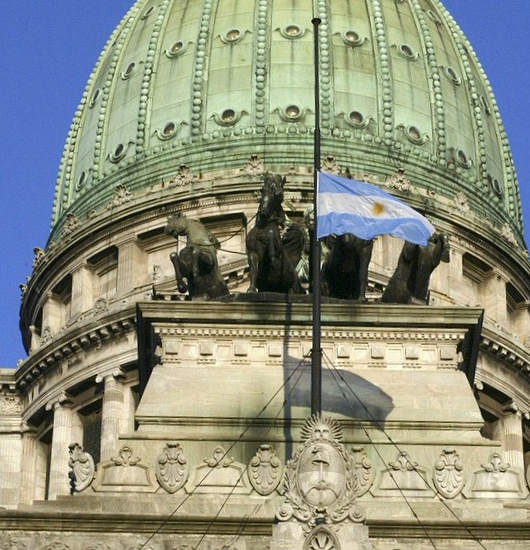
RAÚL ALFONSÍN WAS often a stumbling, bumbling leader when he served as President of the Argentine Republic but, in a country of rampant corruption and abuse, his personal integrity was unassailable. It was probably for that reason that Argentines came on to the streets of Buenos Aires in April to mourn the loss of, certainly not the greatest statesman of the country’s history, but at least something simple: an honest man. For more on the late president, see my piece over at InsideCatholic.com. (more…)
Engineering Democracy in Poland
This is the text of a talk given by Professor Jerzy Przystawa of the University of Wrocław in Poland. Prof. Przystawa is a physicist who specialises in quantum theory, and has been an active civic intellectual as well. He has also participated in the TriaLogos Festival run by the Foundation Hereditas in Tallinn, Estonia.
by JERZY PRZYSTAWA — 22 JULY 2000
“Sensible” democracy and “sensible” sovereignty
By the end of 1918, after generations of fighting and struggling for a free and independent Poland, the Polish people had created their first truly free and independent state for 123 years. However, the independent Polish State merely survived two decades. 71 years later, the first non-communist Prime Minister in the so-called Eastern Europe, Tadeusz Mazowiecki, proclaimed, in the famous shipyards of Gdańsk, that “Poland lives! Free and Independent!”. The majority of the Polish people readily welcomed the newly acquired freedom.
Since that time many factors began to cloud this rosy picture and many people in Poland now have doubts if the contemporary world is indeed interested in a “free and independent Poland” and that the powers of the West, who are somehow considered to be the godfathers of this new Polish State, indeed intend to create something like a sovereign, self-governing Poland. About a month ago, an important American politician, former security adviser and Secretary of State in the Carter administration, Professor Zbigniew Brzeziński, was receiving his honorary doctorate at the prestigious Jagiellonian University in Krakow. In his solemn address to the learned audience, when he proclaimed “the best decade in the entire Polish history”, he did not dwell upon the question of sovereignty and independence. He rather reappealed to the Poles, a number of times, for “wisdom” and “sensible” or “reasonable democracy”. He did not state exactly what “sensible democracy” he had in mind. But from the general context of his speech there can be little doubt that the “sensible Polish state” should be a state with “limited freedom”, “limited independence”, and “limited sovereignity”. It is then also clear that this “sensible democracy” must also be a “limited democracy”.
How to “engineer” democracy?
There are many ways in which to limit the sovereignty and democracy of the states that emerged after the collapse of the Soviet Union. Perhaps the most important is the exploitation of the enormous economical superiority of the West over the impoverished Eastern societies and the ideas of the so called “free” and “open” international markets. However, it is not my intention to discuss how these countries, unable, under the circumstances, to efficiently compete with the West, are becoming, by economical measures, subordinated and subjugated to foreign rule. I shall also not speak about the rules imposed on our countries by the demands of the European Union. It is the liberty of a free country to make treaties and impose any limitations on its functioning to which free people may consent. My talk will be devoted to the political mechanism that may prevent free people from expressing their will in a democratic way and to have their interests properly represented and protected. A major instrument to achieve such a goal are the electoral rules that have been imposed on Poland, and, as a matter of fact, on other post-communist countries as well. This is the so-called Proportional Representation (PR).
Naturally, there are many people, who will maintain that there are various electoral systems in use all over the world and that it is, to a large extent, a matter of taste, which system is chosen for a given country, since none of them is perfect. But let us have a look at what happened after the World War II, when the victorious allies started to engineer democracy in the defeated countries. (more…)
Enda & Declan

“Now you wouldn’t go scuppering this Lisbon deal we’ve got now wouldja, Mr. Ganley?” Mr. Enda Kenny of Fine Gael (left) meets Mr. Declan Ganley of Libertas (right).
While I am accused of being Fine Gael by tribe & temperament, there’s no doubting that party’s been heading in the wrong direction for several decades now. Once moderate in the face of supposed republican extremism, it is now a banal shell of its former self. (Who would Gen. Mulcahy vote for today, one wonders). Those who have the opportunity of voting in the current European elections will doubtless consider voting for Mr. Ganley’s Libertas party, which is running candidates in quite a number of EU member states, including the United Kingdom.
From my inbox
For the record, given that white males launched Roe & have sustained it ever since, the above is a hope all serious Catholics cannot but share.
Pax tibi – [Redacted]
Zuma’s Day
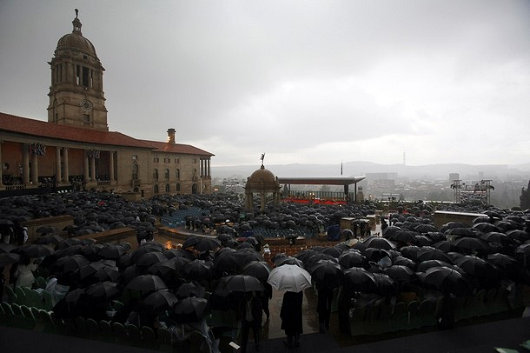
“PRAETORIA PHILADELPHIA” — Pretoria of Brotherly Love — was the formal name for the paramount of South Africa’s three capital cities. Pretoria, the jacarandastad, is home to the Executive; Cape Town, die moederstad, is home to the Parliament, and Bloemfontein, the “City of Roses”, is home to the High Court of Appeal. While the politics of government take place in Cape Town, its actual administration takes place in Pretoria, and all that flows forth from the stately Union Buildings that preside over the city from atop Meintjieskop. The Uniegebou is composed of two wings that come together in a semicircular amphiteatre, symbolizing the coming-together of Briton & Boer in the Union of South Africa. Designed by Sir Herbert Baker, Lutyens’ lieutenant in the building of New Delhi, some believe it to be his finest work.
Some Words from Doorn on the Present Crisis
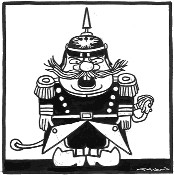 Loyal commenter Steve M. sends word that Kaiser Wilhelm II (currently of Doorn, the Netherlands) has written an open letter to His Excellency President Barack Obama of the United States.
Loyal commenter Steve M. sends word that Kaiser Wilhelm II (currently of Doorn, the Netherlands) has written an open letter to His Excellency President Barack Obama of the United States.
His Imperial Majesty objects to the current practice of appointing “czars” to deal with the various crises at hand, and offers a few alternative suggestions of his own.
Our readers will, no doubt, recall the Kaiser from his previous appearances on his blog here, here, and here.
The Scottish Executive, 1999-2007
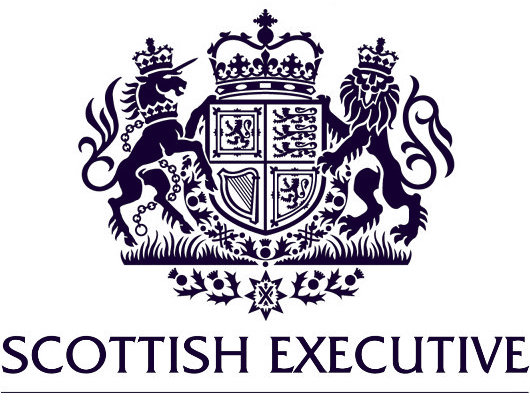
While naturally relieved that Labour are no longer in charge, one of the few objections I have to the current SNP government in Scotland is that they changed the name of the Scottish Executive to “the Scottish Government”. The new name is just so damned boring. Every country, region, town, and borough has a “government”; it’s the dullest word you can come up with. But “the Scottish Executive” had such a nice ring to it. Listening to the evening news on Radio Scotland, one heard the newsreader speak of “the Scottish Executive” and immediately thought “Ah yes, that’s our part of the government!” Now one hears the sultry phrase “The Scottish Government today announced new measures…” and thinks “Oh, the government. Nobody likes the government.”
To add to this lamentable change, they even dumped the Scottish coat of arms as the visual identity of Scotland’s authority (as seen above, in the Executive days) and replaced it with an exceptionally dull saltire-flag logo that can be seen on the Scottish Government’s website.
Premier Salmond, give Scotland back her heraldry!
Paul Comtois of Québec
Farmer, Politician, Hero, Saint

FROM TIME TO TIME there are men in history whose heroism runs so counter to the spirit of the age that the arbiters of passing fashion must simply ignore him rather than run the risk of acknowledging his embarrassing greatness and goodness. God has graced the New World with many of His saints, some of whom — Rose of Lima, Martin de Porres, Mother Seton — have already been raised to the altar, others — Fulton Sheen, Fr. Solanus Casey — are certainly on their way. Yet more remain unsung and almost forgotten: Paul Comtois (1895–1966), Lieutenant-Governor of Québec until his heroic death, is just one of these saints.
Count von Stauffenberg: “We Live in a Society of Lemmings”
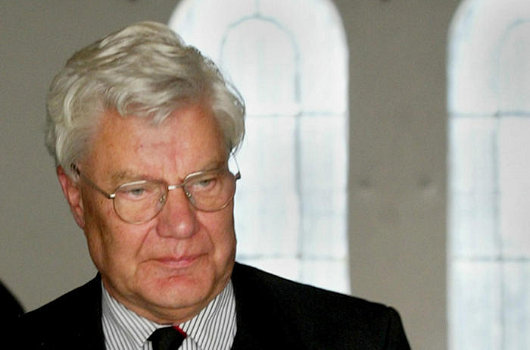
Count Franz Ludwig von Stauffenberg, the third son of Hitler’s would-be assassin Count Claus von Stauffenberg and brother to Gen. Berthold von Stauffenberg, recently spoke to the German magazine FOCUS about Germany’s ratification of the Lisbon Treaty. Stauffenberg, a father of four and grandfather of eight, has spent his life as an attorney and a politician for the Bavarian Christian Social Union party, serving in the Bundestag from 1976 to 1987 and as a Member of the European Parliament from 1984 to 1992.
FOCUS asked the Count about his participation in the German court challenge against the Lisbon Treaty.
“I see the way to [the Constitutional Court] as a last resort,” the Count said, “and had hoped that we could compel a re-think through an ordinary democratic manner, through argument, debate, and public pressure. This has totally failed. I’m not anti-European; I was long enough a CSU Member of the European Parliament. This Europe is no longer compatible with the basic structures of a democratic legal state.”
FOCUS: Has your case something to do with your experience as the son of the resistance fighter Count von Stauffenberg?
“No. My father expected that his children would … stand on their own as a man or woman. I didn’t go into politics from devout worship of my father, but because of the unsuccessful paths of my peers from the generation of 1968.”
FOCUS: Your action comes late. Why have you waited so long?
“In Brussels, there was no sudden seizure of power, but a systematic, persistent development, in which the Bundestag deputies, constantly obedient and even docile, incapacitated themselves. They see themselves as a reserve team for higher office rather than in their actual role as inspectors to reflect, as a counter force on equal footing.”
FOCUS: How can it be that so few see a risk in the Lisbon Treaty, and the rest should be so beaten with blindness?
“In Germany, almost no one wanted to hear concerns. We live in a society of lemmings.”
Link: Graf Stauffenberg: “Wir leben in einer Gesellschaft von Lemmingen” (In German)
Search
Instagram: @andcusack
Click here for my Instagram photos.Most Recent Posts
- Bicycle Rack April 29, 2024
- Burns Tower April 19, 2024
- Patrick in Parliament March 18, 2024
- Articles of Note: 13 March 2024 March 13, 2024
- Cambridge March 9, 2024
Most Recent Comments
Book Wishlist
Monthly Archives
Categories


